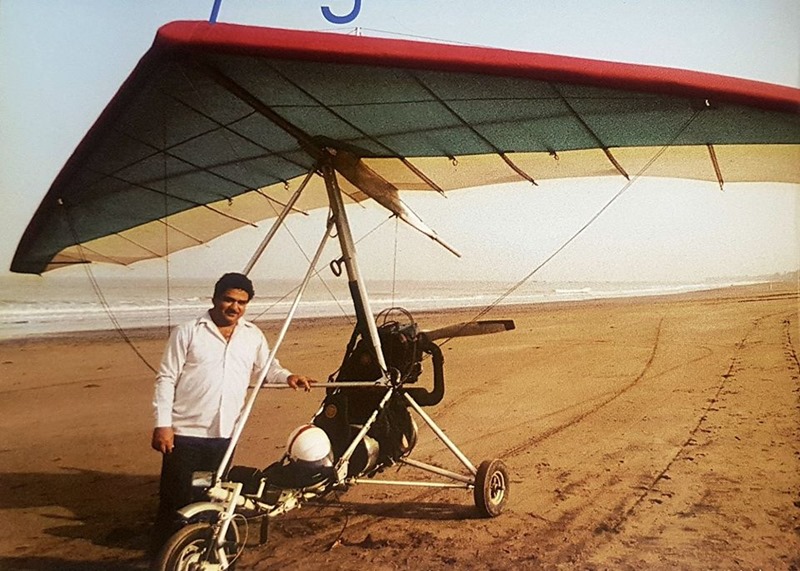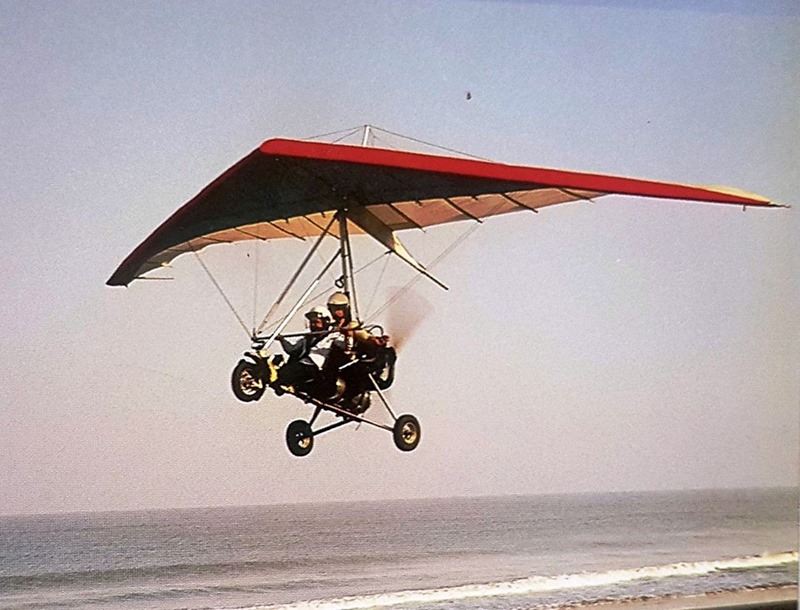The Irani doctor of Dahanu and his flying machine
Dr. Behramshah Mazda, MBBS, was on the phone. Talking to me from Dahanu. Hometown of the Zoroastrian Iranis. About 120-km from Mumbai by road. I was speaking to him after years. But I could picture him easily. A burly, blustery Irani. Trusted in Dahanu for decades as the go-to doctor. Everybody knows him. And for reasons other than his bedside manner and healing touch.
Posted by Mark Manuel on Facebook
I was writing about the Dahanu Thermal Power Station that was threatening the coastal town with ecological disaster. It was coal fired. The Iranis were worried about the black acid rain that had begun falling at night. It was the cause of skin disorders, sore throats and respiratory illnesses. A black residual ash was killing the crops and fruit plantations.
I  met all the Dahanu Iranis over dinner. Some grew lychees there. Others chickoos. There were also bakers and restaurateurs. One was a doctor and an aviator. Iranis are an unusual people. Dr. Mazda was also an excitable person. He convinced me to fly over Dahanu in his ultralight aircraft next morning. I was lightheaded with local toddy and recklessly agreed.
met all the Dahanu Iranis over dinner. Some grew lychees there. Others chickoos. There were also bakers and restaurateurs. One was a doctor and an aviator. Iranis are an unusual people. Dr. Mazda was also an excitable person. He convinced me to fly over Dahanu in his ultralight aircraft next morning. I was lightheaded with local toddy and recklessly agreed.
I thought he had a small plane like what JRD flew from Karachi to Bombay in 1932. Or a crop-duster aircraft used to spray pesticide over fields. Curiously that night, I wondered where Dr. Mazda parked his ultralight. Dahanu had no airport. But 75 km away in Daman was a Coast Guard Station with an airstrip. Maybe he kept his ultralight in a hangar there.
He asked me to meet him on Dahanu beach at 7 am. I found him there with a strange contraption. Like a tricycle with a motor, propeller and hang-glider’s wings. It had two tiny seats. I looked at it in disbelief. “Ready for take-off,” he jovially asked, giving me a helmet and strapping himself down with a seat-belt. I sat behind. Holding his shoulders. And rested my feet on his seat.
I refused to believe this open, flimsy machine could fly. But the propeller whirred, the motor sputtered, and the ultralight came to life reluctantly. Dr. Mazda gave it acceleration. Its controls was a crossbar between the wings. Which he stretched his hands out and grasped. We taxied down the beach and awkwardly took off like an old vulture after a heavy meal.
I closed my eyes, regretting the impetuousness with which I agreed to this unwise adventure. When I opened them, Dahanu was falling away beneath my spread out feet. We climbed at a slow, alarming pace. I held my breath, not believing what I was seeing. Dahanu was a green forest of chickoo wadis, Parsi-Irani mansions, and modern bungalows with swimming pools and big cars.
Dr. Mazda steered the ultralight towards Gholvad. Heading for the gigantic, ugly power station that rose to the sky with sinister dome-shaped buildings and narrow chimneys that were puffing out ashy black smoke. “This is what we are fighting against,” he said. I didn’t like the look of it. So I squeezed his neck. “If you strangle me, who will bring us down,” Dr. Mazda choked in protest.
He turned towards Daman next. “That’s the Coast Guard Station,” he indicated with a jerk of his head, “If I fly any closer they might shoot us down.” I squeezed his neck again. After 20 minutes of flirting with the Gods and elements, Dr. Mazda lined us up with Dahanu beach for landing. The little flying tricycle plunged down in terrifying jolts, buffeted by air currents that threatened to take us up again.
I shut my eyes again. But I could hear the sea restlessly pounding to the right. My heart was in my mouth. “Ready for landing,” Dr. Mazda shouted, laughing like mad. And like a gigantic Boeing coming in to land, he brought us down in stages, riding the air currents carefully so that the ultralight did not suddenly lose height and plunge into the sea.
We landed with a thud, bounced on the beach, and rolled shakily to a halt. Stray dogs sleeping on the sands, startled to find something falling out of the sky, chased us barking. This is not a hobby for the faint-hearted, I thought, unsteadily getting to my feet. But which Irani is faint-hearted! “Have you ever experienced anything like this?” Dr. Mazda asked beaming. “Nothing so crazy,” I said.
But he has given up flying. After 35 years. A Coast Guard Station come up at Dahanu has done him in. It banned flying last year as a security threat. To get permission he had to submit a flight plan. “This was a headache. It was a hobby. But the guy upstairs was telling me, enough! Now it’s dangerous to fly a kite in Dahanu,” Dr. Mazda said humorously. I didn’t know whether to laugh or cry.
DR. BOMANBEHRAM MAZDA is Dahanu’s only Irani general physician. In his spare time, he flies an ultralight aircraft and surveys the chikoo plantations of the coastal town, writes MARK MANUEL who went up with him for a lark.
This is an archive article from 2014 on Upper Crust India
ALL the Iranis of Dahanu are not chikoo and lychee farmers or bakers. Some, like Dr. Behramshah Mazda, MBBS, are also aviators! Yes, medicine is his profession, but flying is his passion. Sunday mornings when the coastal township is still fast asleep, Dr. Mazda gets out his ultralight aircraft and takes off from Dahanu beach. He flies as far as Gholvad, but not Udvada, for that would be trespassing Coast Guard air space and facing the risk of being shot down. It is not a hobby for the faint-hearted. But then which Irani is faint-hearted!
I went up with him for the sheer thrill of the experience. When Dr. Mazda told me about his “aircraft” over an Irani meal laced by intoxicating toddy the previous night, I had readily agreed to join him in the adventure. At the time, I had imagined the “ultralight” to be a “microlight” aircraft of the kind that aviation expert Vijaypat Singhania had flown from UK to India. A sleek, flying machine. But what I saw waiting for me on Dahanu beach at 7 o’clock next morning gave me a shock!
A tiny tricycle fitted with a hang-glider’s wings and an outboard motor with propeller. The contraption had two small seats. Dr. Mazda helped me onto the latter one and took the seat in front. He strapped us both onto this tricycle with wings, then gave me a helmet and wore one himself. Through a small walkie-talkie system fitted into the helmets, he communicated with me.
“Hold onto my shoulders,” he advised. And I did, for there was nothing else to hold onto. “Are you ready for take-off,” he asked. And I commended my soul to God and replied, shakily, “Yes.” Well, the propeller roared into life and the ultralight jerked up. Dr. Mazda put his foot down on the accelerator and we taxied down the beach at great speed. With a sudden roar of energy, like a vulture taking to wings, the ultralight took off and I shut my eyes. When I opened them again, it was to feel the rush of breeze against my face. We had cleared the coconut trees on the beach and were climbing at a slow, but alarming pace. Dahanu beach was falling away beneath my spread out feet. I could hardly believe my eyes. Dr. Mazda now had us as high as a chopper, and I was beginning to regret the impetuousness with which I had agreed to go up with him.
But Dahanu, when I ventured to look down, with its green forest of chikoo wadis and old Parsi-Irani mansions, was looking magnificent. Dr. Mazda kept the ultralight at a constant height and pointed out the township to me. “That is old Dahanu,” he said, indicating with a jerk of his head a cluster of residences that had seen better days. “This is new Dahanu,” he continued, and I could see highrises, modern bungalows with swimming pools and big cars parked in the driveways. “And that is the thermal plant we are fighting against. It is polluting our township.”
I looked. An ugly-looking industrial plant was coming up with gigantic chimneys spewing black smoke into the sky and dome-shaped buildings looking ominously sinister in the early morning sunlight. It is a Brihanmumbai Suburban Electric Supply (BSES) plant and the Dahanu Environment Protection Authority, an autonomous body of the Supreme Court headed by Justice Chandrashekhar Dharmadhikari, has been fighting against it. The Irani farmers blame the drastic drop in orchard produce in recent years to the thermal pollution caused by the plant. Ash, laden with sulphur, which is toxic to agro-produce, has ruined the yield on the chikoo, coconut and even select variety of mango crop.
But sensing my apprehension about flying towards this monolith, Dr. Mazda steered the ultralight around and lined us up with Dahanu beach once again for landing. Then, like a gigantic Boeing landing, he brought the little flying tricycle down in stages, riding the air currents so that we did not plunge or soar unnecessarily. My heart was in my mouth for, to the right was the sea, restless and pounding, and the beach looked too narrow an airstrip to land even in this contraption. But we landed as light as a feather. And stray dogs that were sleeping on the beach, startled to find something falling out of the sky, woke up and chased the ultralight barking madly as it taxied to a halt. “Have you experienced anything like this,” Dr. Behramshah Mazda asked beaming. “Nothing quite so crazy,” I replied. He took it as a compliment.

